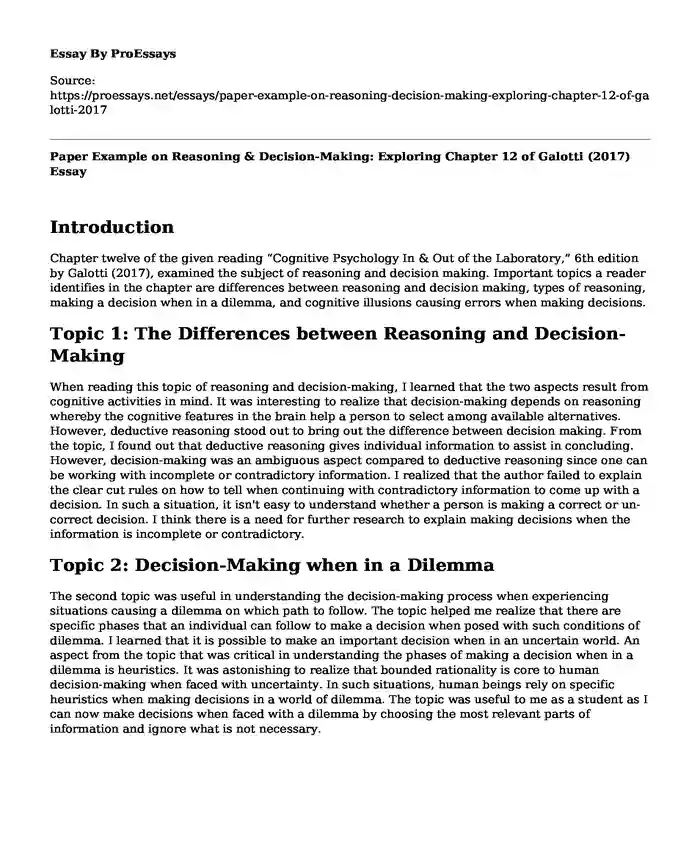Introduction
Chapter twelve of the given reading “Cognitive Psychology In & Out of the Laboratory,” 6th edition by Galotti (2017), examined the subject of reasoning and decision making. Important topics a reader identifies in the chapter are differences between reasoning and decision making, types of reasoning, making a decision when in a dilemma, and cognitive illusions causing errors when making decisions.
Topic 1: The Differences between Reasoning and Decision-Making
When reading this topic of reasoning and decision-making, I learned that the two aspects result from cognitive activities in mind. It was interesting to realize that decision-making depends on reasoning whereby the cognitive features in the brain help a person to select among available alternatives. However, deductive reasoning stood out to bring out the difference between decision making. From the topic, I found out that deductive reasoning gives individual information to assist in concluding. However, decision-making was an ambiguous aspect compared to deductive reasoning since one can be working with incomplete or contradictory information. I realized that the author failed to explain the clear cut rules on how to tell when continuing with contradictory information to come up with a decision. In such a situation, it isn't easy to understand whether a person is making a correct or un-correct decision. I think there is a need for further research to explain making decisions when the information is incomplete or contradictory.
Topic 2: Decision-Making when in a Dilemma
The second topic was useful in understanding the decision-making process when experiencing situations causing a dilemma on which path to follow. The topic helped me realize that there are specific phases that an individual can follow to make a decision when posed with such conditions of dilemma. I learned that it is possible to make an important decision when in an uncertain world. An aspect from the topic that was critical in understanding the phases of making a decision when in a dilemma is heuristics. It was astonishing to realize that bounded rationality is core to human decision-making when faced with uncertainty. In such situations, human beings rely on specific heuristics when making decisions in a world of dilemma. The topic was useful to me as a student as I can now make decisions when faced with a dilemma by choosing the most relevant parts of information and ignore what is not necessary.
Topic 3: Cognitive Illusions Causing Errors in Decision-Making
An exciting subject discussed in chapter twelve of the reading was cognitive illusions that cause errors when making decisions. Cognitive biases and fallacies played a center stage in understanding the contribution of cognitive illusion on why people make irrational decisions. When considering the author's explanation, I can say that cognitive biases are essential in understanding the behavior or people and why they make specific choices. I realized that humans make irrational errors when making decisions due to the present cognitive biases that influence their judgment for a specific task or event. The topic touched all areas of life as affected by cognitive bias since people make decisions in everything and each situation. It is a topic that I can relate to many situations that I find myself, especially when I fail to learn because of making a decision that ultimately leads to the expected outcome. An aspect such as hindsight bias discussed in the topic has informed me about the possibilities of making errors when deciding without comparing the expectation and outcome. In the future, I think I will consider some of these cognitive illusions not to influence the decisions that I make on specific instances.
Conclusion
In conclusion, chapter twelve of the given reading was exciting and essential in understanding humans' reasoning and decision-making. The cognitive abilities in reasoning determine the type of decisions made by a person. The topics captured in the chapter are applicable in everyday situations, and any person can benefit from reading this chapter.
Reference
Galotti, K. (2017). Cognitive psychology in and out of the laboratory. 6th Edition. Sage Publications, Inc. ISBN13: 9781506351568
Cite this page
Paper Example on Reasoning & Decision-Making: Exploring Chapter 12 of Galotti (2017). (2023, Sep 26). Retrieved from https://proessays.net/essays/paper-example-on-reasoning-decision-making-exploring-chapter-12-of-galotti-2017
If you are the original author of this essay and no longer wish to have it published on the ProEssays website, please click below to request its removal:
- Research Paper on Mental Healthcare
- Change in Organizational Policy Paper Example
- Essay Sample on Stars ABA
- Vroom-Yetton Decision Model - Essay Sample
- Effect of my Physical Therapy Experience to my Personal Growth: Personal Statement
- Essay Sample on Organizational Culture: Enhancing Organizational Effectiveness
- Essay Example on John Dawson: An Urgent Call for Change at AGC







